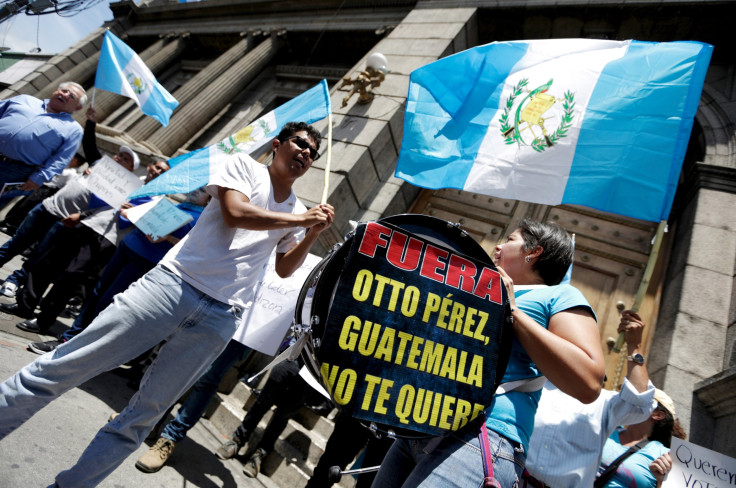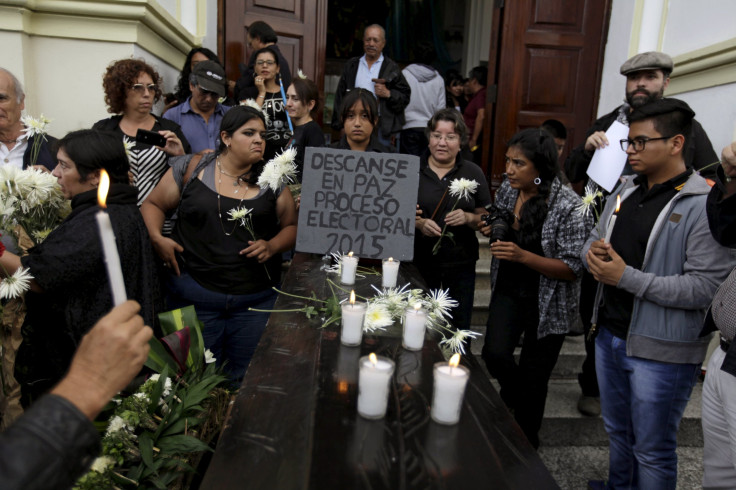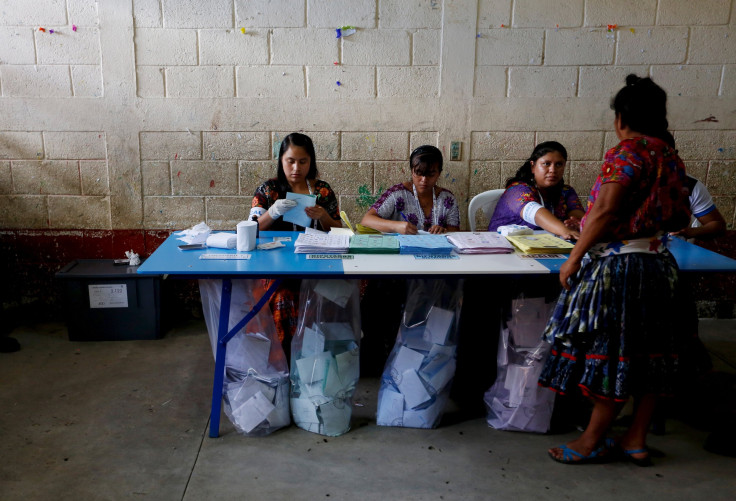Guatemala President Election 2015: Corruption Scandal Rallies Guatemalans Fed Up With Violence And Poor Social Services

Opening a small business in Guatemala, one of the world's most corrupt and dangerous countries, is no easy feat. There are basic challenges, such as the lack of running water in many communities, a limited workforce stunted by overcrowded schools and underpaid teachers, and a heavy-handed government regulation process requiring piles of paperwork and fees. But for those with startup cash to spare, there is an easier way: Bribe a government official.
"You see it all the time. Some business owners solve every problem with a bribe," said Karen Gonzalez Hernandez, 33, a community organizer in Guatemala who helps low-income women in rural villages start businesses. "And those people don't have to pay taxes, of course."
Guatemala has been shaken by widespread reports of government corruption in recent months in a scandal that has pummeled Central America's largest economy and sparked massive demonstrations across the country. More than 20 officials and businessmen have been arrested for defrauding the national tax agency and customs office of more than $100 million in revenue, while President Otto Perez Molina resigned last month after he was accused of accepting $3.7 million in bribes, charges he has denied.
Molina is a former special-forces soldier and the ex-leader of a military intelligence unit linked to allegations of human-rights abuses who won election in 2011 after vowing to stomp out official misconduct and crime. The public outrage surrounding his fall from power has overshadowed the nation's presidential election slated for Sunday. Leading the polls is Jimmy Morales, a well-known comedian backed by former military officers linked to allegations of genocide. The other candidate, Sandra Torres, is a former first lady whose center-left party is under investigation for illegal campaign financing.
"Neither of them represent the concerns of the people," said Ninotchka Mutate, executive director of Fundacion Crecer, a civic group in Guatemala City dedicated to encouraging urban renewal. "It is basically just a continuation of power. But the public, especially the young people, have changed. There is a bigger political participation, and it means that it doesn’t matter which candidates wins, the people are engaged, they have turned out a government, and we are empowered."
Guatemalan politics have long been plagued by reports of corruption. Roughly three-quarters of all the nation's lawmakers have financed their election campaigns with money from organized crime, according to a report by the United Nations Commission Against Impunity in Guatemala. Its investigation determined that criminal groups could purchase a lawmaker's favor for as little as $5,000, thus ensuring political protection. The exchange of cash is particularly striking in a country where the poorest 40 percent of its 15 million citizens live on just $1.50 per day.
The cozy relationship between lawmakers and organized crime has seen high rates of violence plague Guatemala in recent years, impeding economic growth in a nation that depends heavily on foreign investment. Guatemala has one of the world's highest homicides rates, with 16 murders a day. Roughly 14 of Guatemala’s 34 professional associations have reported extortion attempts against their employees, according to the national Coordinating Committee of Agricultural, Commercial, Industrial, and Financial Associations. Meanwhile, Guatemala's economy is expected to grow by 4.2 percent this year.

Community organizer Gonzalez said many Guatemalans struggle with low wages and live in poverty. Roughly 15 percent of Guatemalans can't read, one of the lowest literacy rates in the Western Hemisphere. In some parts of the country, even teachers earn as little as $2 a day.
"We need strong leaders who aren’t afraid and will bring the change that we have all been waiting for," Gonzalez said. "There is a great exasperation like, 'Oh, what do we do? What do we do?' These recent protests have really been a wake-up call to how corrupt Guatemala has become."
Government corruption is also seen in the country's high infant mortality rate fueled by inadequate medical resources such as a lack of widespread prenatal care, as well as its third-world schools, infrastructure and law-enforcement agencies, said Juan Carlos Zapata, executive director of Fundesa, a nonprofit group that helps business organizations. But lawmakers' unusual wealth particularly began to frustrate the nation's many low-income citizens in recent years as numerous investigations showed politicians enjoying private jets and luxury cars, he said.
"You thought, 'How it is possible that someone with a public salary has a house in one of the most exclusive areas on the coast?' The government just thought the people were stupid, like we couldn't see what was happening," Zapata said. "We need a government that doesn't get rich off the people."

Carlos Lopez, 42, makes $20 a week as a mechanic in Guatemala City. It's barely enough to support his family, and he worries that his two children will also have to one day work long hours for paltry wages. Perhaps his children could get professional jobs as adults if their teachers were better paid and more engaged or if Guatemalans could focus on economic growth instead of worrying about avoiding violence, he said.
"All the money they stole, that's money that could have been spent on making Guatemala a place where we could grow, have a better future," Lopez said of the government corruption scandal. "We have nothing -- and they take our money and live fancy lives and do nothing for us."
For the most optimistic, citizens' anger toward the government is a positive change. Jose Herrera, executive director of Empresarios Juveniles, a business network for young Guatemalans, said he hopes the country's economy will stabilize after the recent bout of political instability because people will have more faith in a new government.
"The events of recent months has strengthened our political and democratic climate with respect to the economic situation," Herrera said. "And in the future I think it will improve now that investors can feel more confident."
Others claimed Guatemala has largely shrugged off the recent political crisis because government corruption is considered routine in Central America. "I haven’t gotten the feeling that investor confidence in Guatemala has been that shaken as a result of the recent corruption scandals," said Michael Allison, associate professor of political science at the University of Scranton in Pennsylvania and author of the "Central American Politics" blog. "Most businessmen and investors already knew about the deep-seated corruption in Guatemala."
Before the election Sunday, a poll by Prensa Libre newspaper this week showed Morales with 68 percent of voters’ support and Torres with 33 percent. But for many Guatemalans, the growing battle against corruption will be won over time, not at the polls this year. In recent months, protests have drawn crowds of as many as 60,000 people, including students, business owners, teachers and farmers.
"We have a long way to overcome the enormous weaknesses in the country -- malnutrition, inequality, security and drug trafficking," said Mutate of Fundacion Crecer. "But now we have the conviction as a people to unite efforts and move toward a better Guatemala."
© Copyright IBTimes 2024. All rights reserved.






















